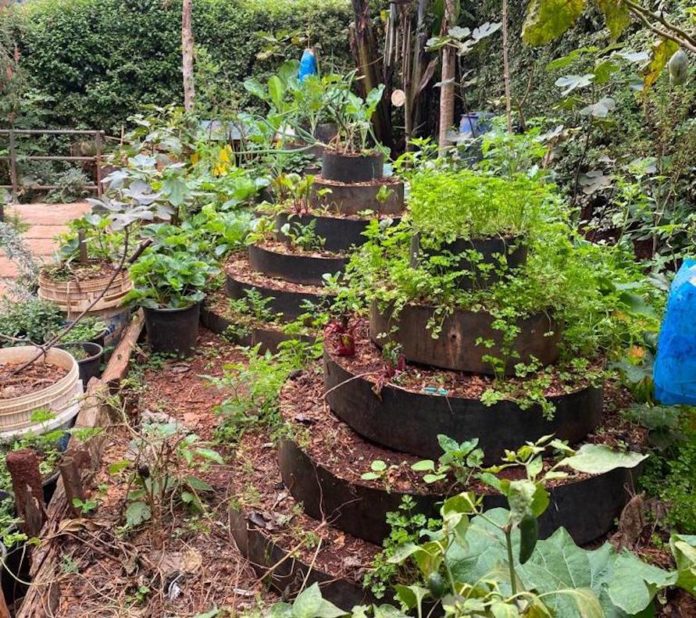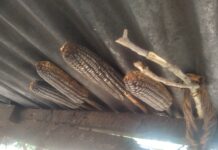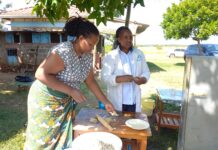By Henry Owino
Kiambu County, Kenya: In the hilly slopes of Bamboo Ridge estate in Fort Smith at Ndumboini off Gitaru road in Kabete Constituency, Kiambu County lives Alice Mwangi, a peasant urban farmer. She has a great interest in growing food using natural systems as well as influencing and inspiring neighbors to do the same.
Ms. Mwangi’s interest dates back to when she ventured into organic farming, and bio-dynamic gardening. As a permaculture and agroecologist, she combines both skills to manage her garden on a quarter-acre piece of land.
Ms. Mwangi has utilized a small space to grow a variety of food crops which she also calls home. Being located on a hilly landscape, the garden is almost vertically inclined. However, Ms. Mwangi has managed the hillside contours by terraces that reduce the rapid flow of water down the slope when it rains.
“Even though my garden is on a steep slope terrain, I managed to tame it by using the hillside contours to plant on terraces. This way, it has helped in reducing the velocity of runoff water by heavy rainfalls hence no soil erosion,” Ms. Mwangi explained.
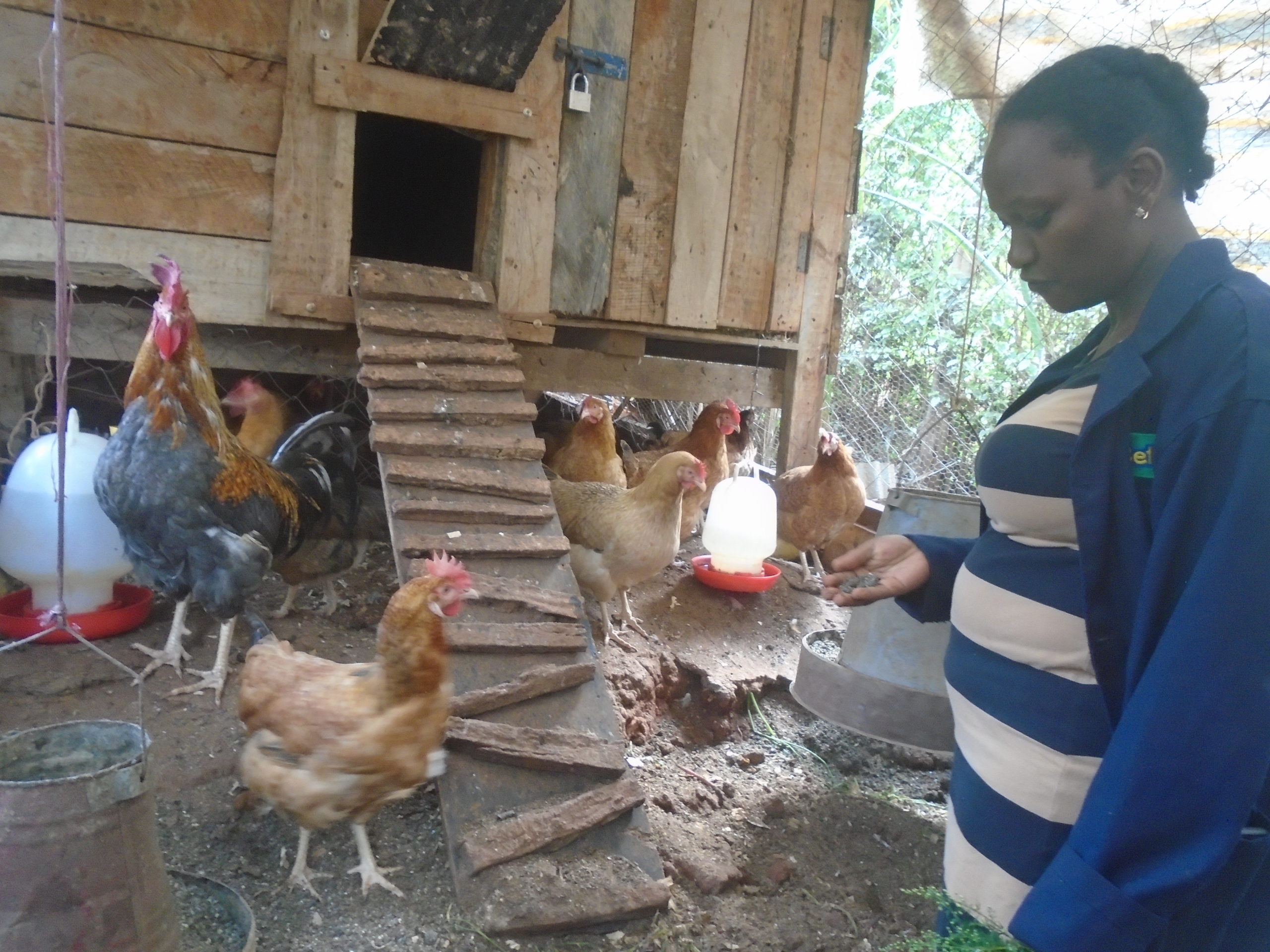
Some of the food crops Ms. Mwangi grows are hardly cultivated even by large-scale farmers in open fields countryside. In her small piece of land, she keeps chicken, rabbits, fish, and an apiary of domesticated bees, a complete network.
Ms. Mwangi’s urban farming system is a cutting edge over many urban gardening in Nairobi and its environs. In fact, one can easily mistake Ms. Mwangi’s home area for a forest ranger station as it is occupied by fruity trees covered around it.
As Human Ecologist Expert with a passion for urban farming, Ms. Mwangi began the initiative in her new home compound in 2018. To date, the land is completely fertile with all manner of veggies, fruits, and tubers, among a variety of edible seeds of pod-bearing plants such as peas, beans, and lentils you name it.
For example, some plants make Ms. Mwangi’s home apartment appears busy and bushy including the rare chop-suey greens. This is a plant with succulent edible leaves, with a nice aromatic flavor eaten either raw or cooked.
She managed to naturalize this chop-suey plant in her cool hillside garden apartment which is now providing an aromatic scent in the forested home. As matter of fact, every green plant that grows in Ms. Mwangi’s apartment is edible, consumed either as food or medicinal.
“Two of my favorite things in life are; gardens and food. This is because everything that feeds human beings comes from the soil,” Ms. Mwangi disclosed.
She grows crops in large recycled plastic bags, medium polythene bags, and small containers depending on the plant’s size. However, a few crops are grown on raised seedbeds while tubers such as cocoa yams are left to grow directly on the ground.
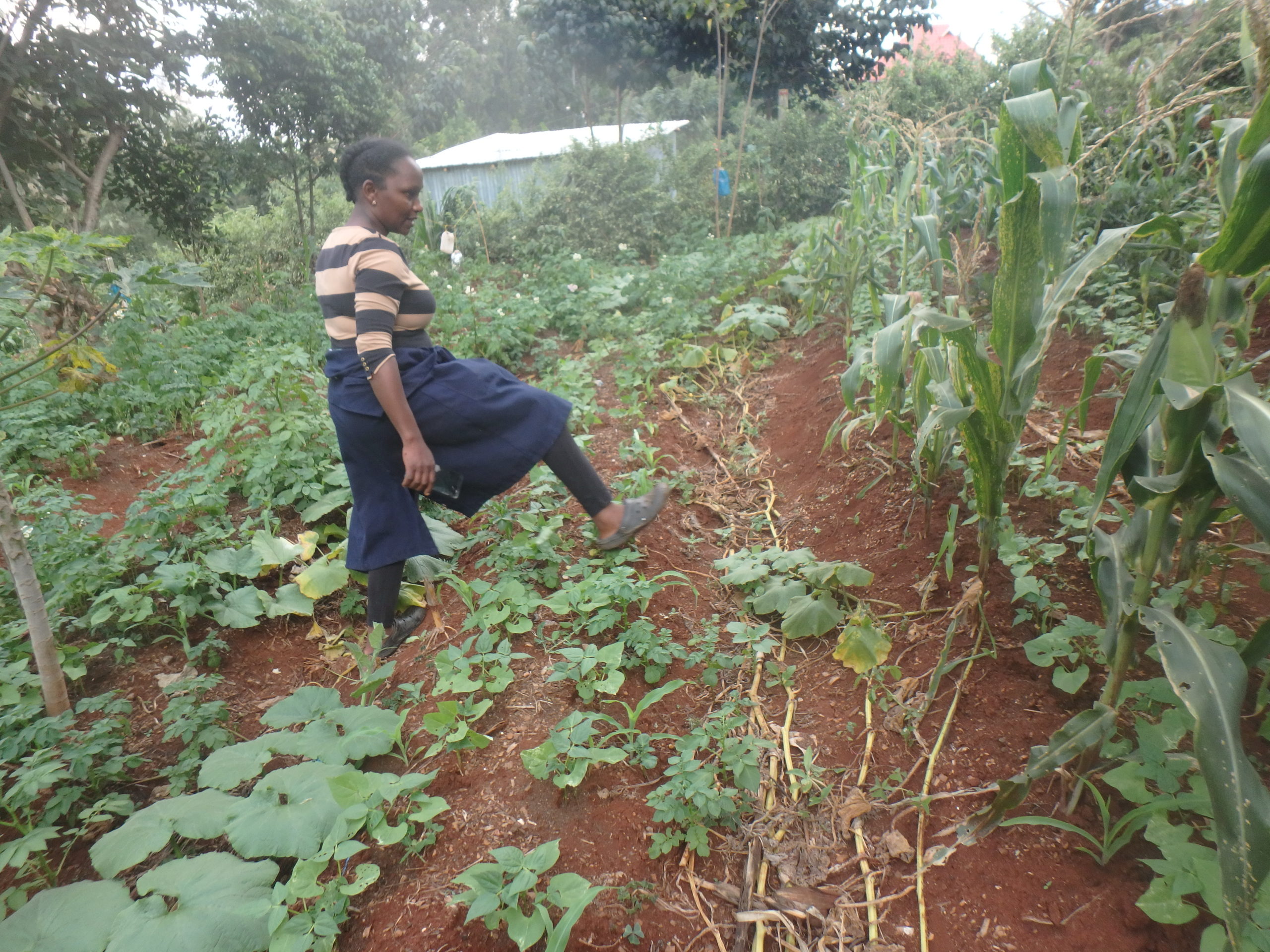
Ms. Mwangi’s urban farming may differ from another urban gardening in terms of plant variety grown. Her farming system specifically uses organic matter and thus involves compost manure, animal waste, and kitchen organic leftovers.
Ms. Mwangi collects rabbits’ urine which she uses as pesticides against pests and diseases in crops and adds nitrogen to the soil. While the bees enhance fast pollination on the farm, chicken droppings are manure and used as feeds for fish.
“My farm is famous as Hillside Organic Garden. This is because it is located on a hilly landscape and I grow my food crops using purely organic manure. The organic manure is generally waste from my kitchen leftovers such as fruit peelings, vegetables, and animal waste,” Ms. Mwangi affirmed.
She also decomposes fallen tree leaves, grass trimmings, wood pieces, cartons, maize cobs, and stalks or any organic materials. Decomposition takes between 4-6 weeks after which she adds alternative organic compost manure.
“My urban farming is an integrated farming system which is interdependent, interrelated, and interlocking production. It simply means that I grow crops, rear rabbits, chicken, bees, and fish that maximizes on the utilization of nutrients of each other,” Ms. Mwangi explained.
“Organic farming also minimizes the negative effects of soil and weather patterns thus protecting the environment for urban farming,” she added.
“It is now 5 years since I ventured into the urban farming initiative. I began small using simple waste materials with a focus on gradual growth to utilize the limited space to grow my own food,” Ms. Mwangi recalled.
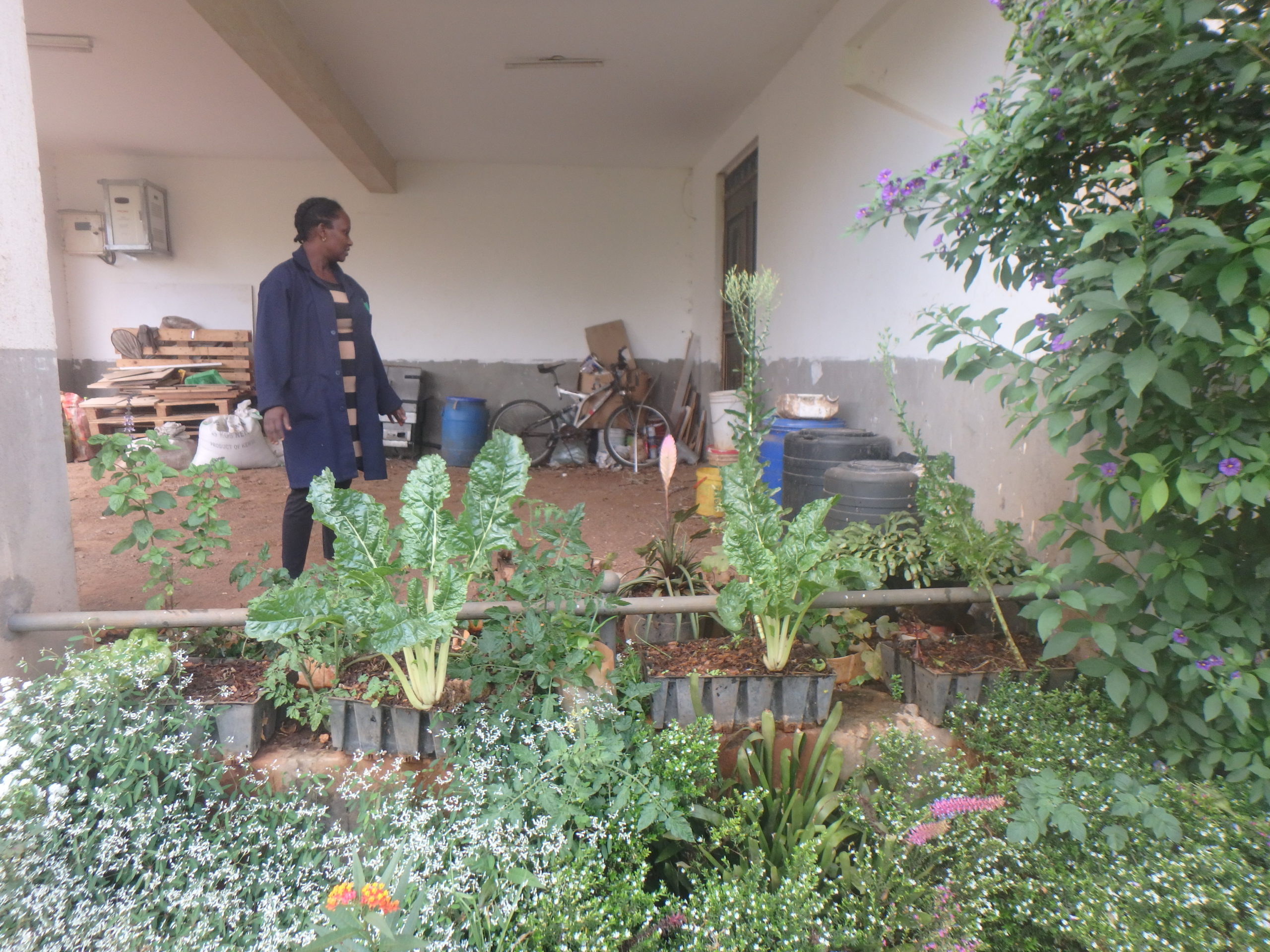
Today, some of the plants thriving at Ms. Mwangi’s hillside organic garden include; carrots, beetroots, dragon fruits, fig fruits, mints, raspberries, strawberries, blueberries, water spinach, turmeric cherish, capsicums, hot pepper, carrots, arrow roots, cocoa yams, passion fruits, coffee trees, collard greens, tomatoes, onions, lemon grass, lemon balm, lavender, chives, pawpaw, bananas among other edible greens.
Ms. Mwangi’s motivation is driven by self-sufficiency in food production in small spaces. She has managed to cut costs in her daily kitchen budget, with extra income from sales of surplus. Notwithstanding, trainees around her neighborhood join the urban farming initiative through her monthly virtual online training.
“I used to spend Ksh 1000 (approx. USD 10) in a week on collard greens, tomatoes, onions, and arrow roots just before I ventured into urban farming,” Ms. Mwangi recalled. To make matters worse, organic food crops cost much higher compared to crops grown conventionally in most Kenya supermarkets,” she regretted.
“So, apart from my love for gardening and providing food for myself, urban farming saves me money, it is aesthetic and refreshes the mind, especially after a day’s busy work,” she added.
Today Ms. Mwangi is able to manage her time and saves money on fuel unlike in previous years getting stuck in traffic jams to and fro the supermarket to buy vegetables. So, urban farming has resolved the pressure of work hence reducing of mental stress that tortures most urban dwellers.
The farm ensures no food wastage as one only harvests what is enough for the family to consume for the day while fresh with all nutrients. She makes beverages from coffee berries among many fresh natural juices from fruit trees in her garden.
“By growing my own food, I am always sure of my food security throughout the year. I eat fresh, safe, and quality food whose source is known 365 days a year. Food that is grown free from chemical use hence healthy,” Ms. Mwangi compared.
Agroecologist boasts of eating fresh indigenous veggies, and a variety of fruits that are nutritious and reach in vitamins. Capsicum, hot pepper, and fresh chives, among other spicy plants, are currently in high demand because they are good at fighting flu, colds, and fungal infections. It also improves metabolism, promotes weight loss, and benefits the digestive tract among other lifestyle diseases it controls.
“Medicinal herbs like lemon balm have helped keep some diseases at bay thereby family rarely fall sick. Citronella or lemon grass is most effective at repelling mosquitos and other pests,” Ms. Mwangi emphasized. Most of the plants contain some fragrance that scares away dangerous reptiles while keeping compound ever fresh and attractive,” Agroecologist added.
“I am able to grow and maintain medicinal plants like Artemisia-annua used in traditional medicine for fevers, inflammation, headaches, bleeding, and malaria. Nowadays they are very rare to find because of industrial fertilizers that have poisoned soils,” Ms. Mwangi regrets.
Another herbal plant is Lavender which is more than just an aromatic plant. Studies suggest it may help relieve stress, chronic pain, high blood pressure, and asthma.
Ms. Mwangi harvests rainwater to use later during dry seasons, apart from recycled water from the kitchen, and laundry for watering the plants. She has a borehole sunk where she draws much water for the crops in addition to the piped tap water.
She sells excess compost manure, crops, fruits, chicken, rabbits, honey, and fish to neighbors or other interested farmers.
Ms. Mwangi trains people who want to start growing their own food in small spaces in their peri-urban and urban homes. The webinar training has since been dubbed ‘Shamba Jijini’ a Swahili word for regenerative urban farming. The forum today has approximately 80 audiences without prior agriculture skills but today have created a completely new career path for themselves earning a living from it.
Her plea to urban dwellers is that urban areas need not be concrete jungles because there are many creative ways to turn around and grow your own food and feed families. It can be done with sacks on balconies, veranda, windowsills, rooftops, or backyards, renting open space for the community around as long as there is water, air, and sunlight.

